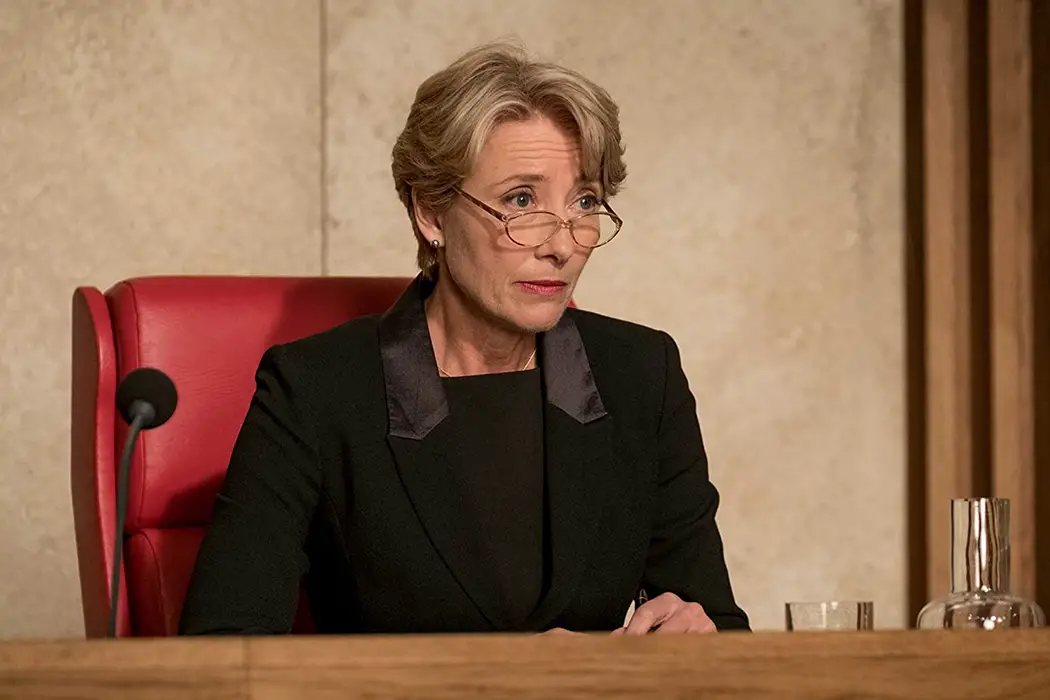THE CHILDREN ACT: A Beautifully Complex Pair Of Performances Holds Uneven Drama Up

Nathan decided to take a gap year after completing his…
The Children Act is a more complex film than you may expect. What was sold as a courtroom drama exploring the morality of a (female) judge ruling over a case influenced by religious views actually becomes, for better or worse, a more nuanced examination of life and death, ideals, consequence and freedom. Richard Eyre presides over writer Ian McEwan’s latest screen adaptation to largely positive, soulful, if muddled, effect.
Fiona Maye (Emma Thompson) is a judge in the High Court of Justice of England and Wales, focusing on highly-emotional, time-consuming family cases that have gradually caused her personal life and relationship with husband Jack (Stanley Tucci) to strain. One case, that of 17-year old Adam Henry (Fionn Whitehead) who is suffering from leukaemia, particularly affects her: Adam’s doctors want to perform a blood transfusion that will allow them to use more drugs to work towards a cure, although this is against the wishes of Adam and his parents, who are Jehovah’s Witnesses.
Brimming with emotion and poignancy
In a sea of superheroes and blockbusting spectacle, it is nice to have the welcomed relief of a piece of filmmaking more gentle and subtle in its aim than those that have been ruling the box office during these warmer months. While that’s in no way intended to dismiss cinema’s money-making bread and butter, the change of pace with The Children Act will be gladly received by many. Adapted from McEwan’s best-selling, acclaimed novel, and following on from his mixed success with On Chesil Beach and The Child in Time, this latest attempt is arguably his strongest since 2007’s Atonement, although not one without its flaws.

Brimming with sentiment and poignancy, The Children Act is an admirably complex and layered piece of cinema, as uneven as it is. McEwan’s screenplay is a bracing and intelligent exercise in British filmmaking that covers a plethora of themes. Greatly concerned with morality and the ethics of religion, the juridical process and individual responsibility, The Children Act has more going on than initially perceived. Despite never fullying embracing the multitude of themes or exploring all of them with the individual depth to make it wholly satisfying, it is packed with sharp dialogue, interesting dynamics and well-wrung emotion, stirring and sombre as necessary.
A major flaw found within McEwan’s screenplay is the difficulty regarding pacing: strongest during its open act, the film struggles to sustain a tight opening after half an hour, particularly as more laboured plot advancements come into play. The resulting padding and contentious motivations mean the two halves don’t coalesce as seamlessly as hoped, turning increasingly clunky as the runtime goes on. While that is not to say that the second half completely drops the ball, as it certainly lands on a teary, subdued conclusion and continues to tackle some of the more significant themes effectively, it definitely pales compared to the first half.
Thompson is constantly engaging and fascinating
Richard Eyre’s direction is clean and crisp, developing a palpable emotion which carries the film through the more melodramatic, stodgy moments that weight the picture down. In the courtroom sequences, he affirms Maye’s power through his use of camera angles which slowly begin to waver as the moral conundrum continue to eat away at her; visually and physically, she weakens, with the stress and burden of her dilemma lingering over her. It’s incredibly well-judged and terrifically-calibrated, meaning The Children Act works strongest as a tight character study of the central female figure, elevated to higher ground by the astonishing lead performance.

Managing to keep The Children Act together is the sheer magnitude and impression made by Emma Thompson’s beautifully-complex performance. She impressively powers along the moving, sombre story, constantly engaging and fascinating at every turn; she casts light onto Maye’s professional and personal life, along with the overlap that comes into play during the film’s second and third act. Fantastically towering, Thompson possesses a natural charisma and magnetism that ensures that she remains endlessly watchable and compelling, even throughout the film’s narrative bumps. As someone constantly challenged in her career and with the power of making life-changing decisions for others, the sudden jolt in her life – delivered by the two men – shake her foundation, and Thompson is reliably formidable documenting such a fallout.
Relatively newcomer Fionn Whitehead, fresh from impressing in Dunkirk last summer, more than holds his own against the veteran Thompson, magnificently reflecting her nuanced and affecting performance with an equally profound supporting turn. It is a performance both defined by and restricted by life and death, with Whitehead up to the task of presenting a teen forced to face his own mortality at such an impressionable age. This is all in spite of the questionable character decisions and actions that falter the film in the second act, cooked up only to spur the narrative forward towards its heartrendering conclusion.

In Conclusion: The Children Act
The Children Act is a stirring, well-intentioned piece of classy British cinema that will satisfy but ultimately sadden its intended audience, propped up by Emma Thompson’s wonderfully complex, moving performance and strong supporting work from Fionn Whitehead (and Stanley Tucci, in a more thankless, underdeveloped role). It’s strongest in its opening act, which makes what follows a little disappointing and unharmonious in comparison; while it’s not a complete waste of resources, it seems scattered and unfocused, leaning heavy on the melodrama and not as seamlessly stitched together as one would like.
As someone with a significant connection to the subject matter at hand here, I was no doubt moved by The Children Act, and while some of the narrative developments are a little puzzling, and character behaviours are irrational, the general accomplishments are enough to work in the film’s favour. It won’t be an award season player, although perhaps Thompson will earn some attention in the starring role, yet The Children Act’s prodding of morality and decidedly bleak approach make it a worthwhile ruling.
Which is your favourite performance from Emma Thompson?
The Children Act is out in the UK. It will be given a limited theatrical release in the US on September 14. Additional release dates can be found here.
Does content like this matter to you?
Become a Member and support film journalism. Unlock access to all of Film Inquiry`s great articles. Join a community of like-minded readers who are passionate about cinema - get access to our private members Network, give back to independent filmmakers, and more.
Nathan decided to take a gap year after completing his A-Levels (Media Studies, English Language & Literature and Drama & Theatre Studies) to gain some journalism and media experience before making the next step. In that time, he has continued to run his blog - PerksOfBeingNath - which is now approaching its second anniversary and crammed in as many cinema visits as humanly possible. Like a parent choosing their favourite child, he refuses to pick a favourite film but admits that it is currently a tight race between Gone Girl and La La Land. Self-admitted novice on cinema of the past and always open to suggestions. http://perksofbeingnath.blogspot.co.uk












